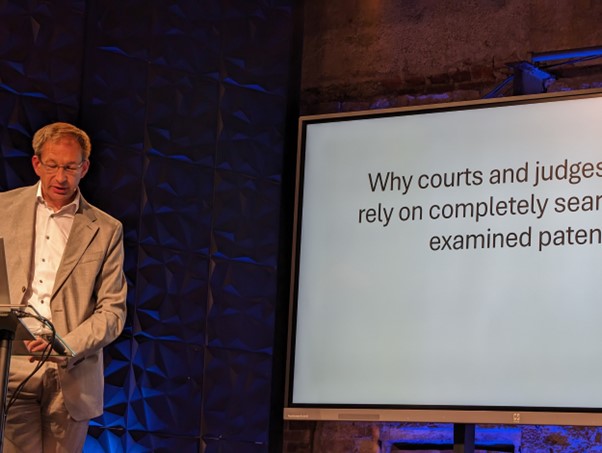Ensuring Patent Quality for Sustainable Innovation: A Conference Report
On June 14, 2024, industry leaders, academics, and legal experts gathered for the Industry Patent Quality Charter Conference, focused on addressing the pressing issue of patent quality. The conference underscored the fundamental role that high-quality patents play in fostering innovation and maintaining the integrity of the intellectual property (IP) system. Despite advancements, concerns about the current examination principles of patent offices were thoroughly discussed, revealing a landscape where many granted patents may not hold up under scrutiny, thereby wasting resources and potentially hindering crucial innovations.
Welcome and Introduction by Beat Weibel, Siemens
Beat Weibel opened the conference by emphasizing the importance of valid and enforceable patents for industry stakeholders. He highlighted the increasing grant rates at the European Patent Office (EPO) and raised concerns about the potential decline in patent quality due to the focus on efficiency and timeliness. Mr. Weibel stated, “What we need as an industry are valid and enforceable patents. This can only be achieved through thorough examinations, not by taking shortcuts that compromise patent quality.” He elaborated on the role of patent offices, asserting that their mandate should include ensuring the robustness of patents, not merely their rapid processing.
Mr. Weibel pointed out that the strategic plans of patent offices often prioritize metrics like efficiency and timeliness over substantive examination quality. This approach can lead to a high quantity of granted patents, but at the cost of their validity and enforceability. “Our industry depends on patents that can withstand legal scrutiny and provide reliable protection for innovations,” he emphasized, calling for a re-evaluation of these strategic priorities.

Business Models of Patent Offices by Prof. Dr. Christoph Ann, TU Munich
Prof. Dr. Christoph Ann provided an insightful analysis of the business models of patent offices, critiquing their profit-driven approach. He argued that the primary focus should be on granting patents that are robust and reliable. Prof. Ann remarked, “Patent quality means patents that are usable, recognized by investors, and capable of withstanding legal challenges. This requires rigorous examination, which is often compromised by the pursuit of revenue.”
He discussed the inherent conflict between the financial objectives of patent offices and their duty to grant high-quality patents. Prof. Ann highlighted that many patent offices are under pressure to be financially self-sustaining, leading them to prioritize the quantity of granted patents over their quality. “This profit motive can undermine the very purpose of the patent system, which is to foster genuine innovation,” he argued.
Prof. Ann proposed several measures to address this issue, including increased transparency in examination procedures and a reassessment of how patent office performance is measured. He stressed the need for a balanced approach that considers both efficiency and thoroughness, ensuring that the patents granted truly reflect the innovative contributions they claim to protect.

Impact of Inadequate Examination by Dr. Filip de Corte, Syngenta
Dr. Filip de Corte illustrated the detrimental effects of inadequately examined patents on innovation. Using the metaphor of a Greek drama, he explained how insufficient scrutiny leads to patents that, while granted, lack real value. Dr. de Corte stated, “By awarding patents too easily, the office undermines the value of patents that truly protect inventions. This not only wastes resources but also blocks potential innovations due to legal risks.”
Dr. de Corte emphasized the practical implications of this issue, noting that companies often invest significant resources in developing and patenting new technologies. When these patents are later found to be invalid, the result is a substantial waste of time, money, and effort. “Invalid patents create a false sense of security, leading companies to make business decisions based on unreliable IP,” he said. He also pointed out that this situation can lead to increased litigation, as competitors challenge the validity of patents that should never have been granted.
He proposed several solutions, including stricter examination standards and greater accountability for patent examiners. “We need a system that rewards thoroughness and penalizes shortcuts,” Dr. de Corte argued, suggesting that this approach would ultimately lead to a healthier innovation ecosystem.

Importance for the Life Sciences Industry by Dr. Jörg Thomaier, Bayer
Dr. Jörg Thomaier emphasized the critical need for high-quality patents in the life sciences sector, where the stakes are incredibly high. He noted that the business model of life sciences companies relies heavily on patents to recoup the significant investments in research and development. Dr. Thomaier highlighted, “Valid and stable patents are crucial for our industry to innovate and deliver life-saving products. Invalid patents waste resources and slow down innovation, ultimately harming society.”
Dr. Thomaier explained that developing a new pharmaceutical product can take over a decade and cost billions of euros. During this time, companies depend on the exclusive rights provided by patents to secure a return on their investment. “If these patents are not enforceable, the entire business model collapses,” he stated. He also noted that invalid patents can prevent the development of new treatments, as companies may be reluctant to invest in areas where patent protection is uncertain.
He called for a more rigorous examination process, particularly for patents in the life sciences sector. “Our industry cannot afford to have its innovations undermined by poor patent quality,” Dr. Thomaier said, advocating for a system that ensures only truly novel and non-obvious inventions receive patent protection.
Legal Perspectives by Judge Tobias Pichlmaier, UPC
Judge Tobias Pichlmaier provided a legal perspective on the importance of patent quality from a judicial standpoint. He stressed that courts and judges depend on thoroughly examined patents to ensure justice and uphold the rule of law. Judge Pichlmaier stated, “The legal validity of a patent is sufficiently established if the patent has already survived first-instance opposition or nullity proceedings. Unlawful rules should not be applied, making it crucial that only robust patents are granted.”
He highlighted the critical role of opposition proceedings in maintaining patent quality. “The opposition process serves as a vital check on the initial examination, ensuring that only patents that can withstand scrutiny are upheld,” he explained. Judge Pichlmaier also discussed the broader implications of granting invalid patents, noting that they can lead to a loss of confidence in the patent system as a whole. “When patents that should not have been granted are enforced, it undermines the credibility of the entire system,” he warned.
Judge Pichlmaier called for greater cooperation between patent offices and the judiciary to ensure that patents are rigorously examined and upheld. He suggested that regular reviews and audits of examination processes could help identify areas for improvement and ensure that patent offices are meeting their responsibilities.

Conclusion
The conference concluded with a robust panel discussion and Q&A session, where participants reiterated the need for patent offices to prioritize quality over quantity. The consensus was clear: ensuring patent quality is vital for sustaining innovation and maintaining the integrity of the IP system. This requires action from all stakeholders, and corporate applicants are encouraged to join the Industry Patent Quality Charter to drive the necessary changes. The insights and recommendations from the conference provide a clear roadmap for improving patent quality and ensuring that the IP system supports and protects genuine innovations.
In summary, the conference highlighted the urgent need for reform in patent examination processes to support sustainable innovation. By focusing on thorough and rigorous assessments, the patent system can prevent the granting of invalid patents that waste resources and block future innovations. Stakeholder involvement is crucial in this effort, and the Industry Patent Quality Charter invites corporate applicants to collaborate in advocating for these essential changes.

About the blogpost author:
 Ricardo Cali is passionate about people and technology. He likes to connect with other experts to exchange ideas and thoughts. With Questel, he enables IP Managers, Patent counsels, IP professionals and attorneys to receive state-of-the-art patent searches and Intellectual Property software and supports their IP duties.
Ricardo Cali is passionate about people and technology. He likes to connect with other experts to exchange ideas and thoughts. With Questel, he enables IP Managers, Patent counsels, IP professionals and attorneys to receive state-of-the-art patent searches and Intellectual Property software and supports their IP duties.



